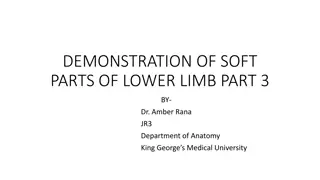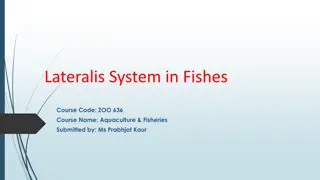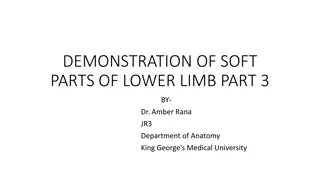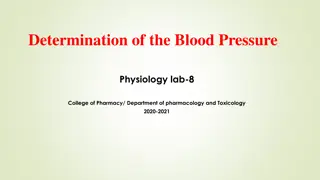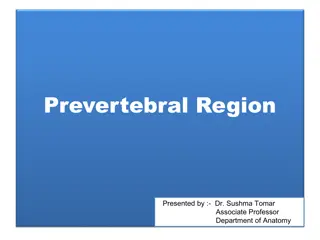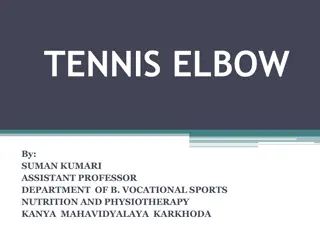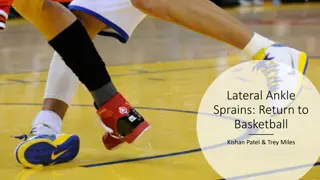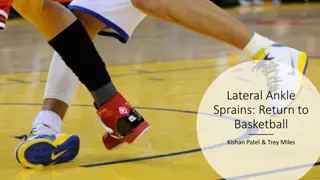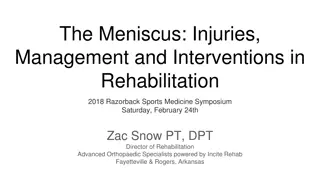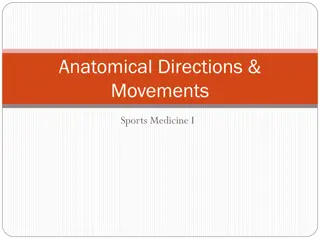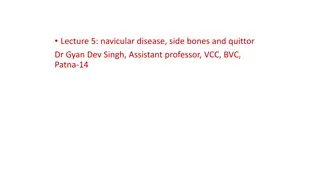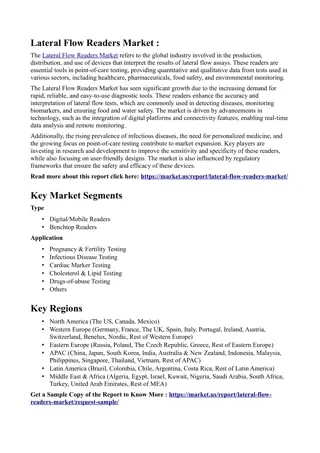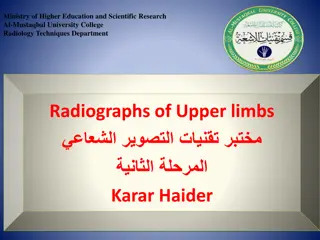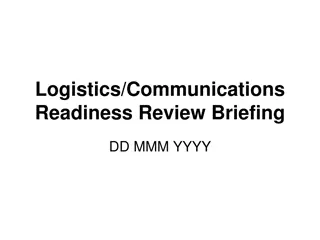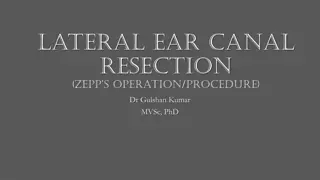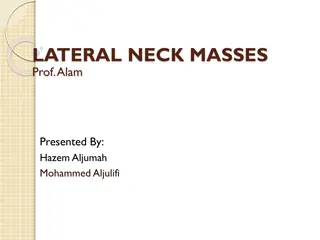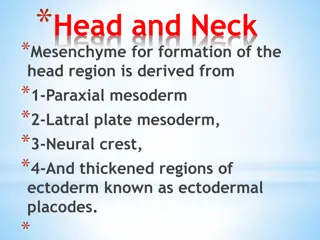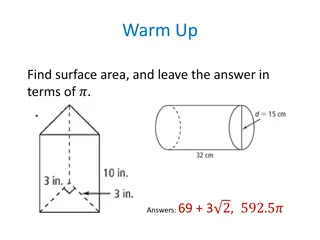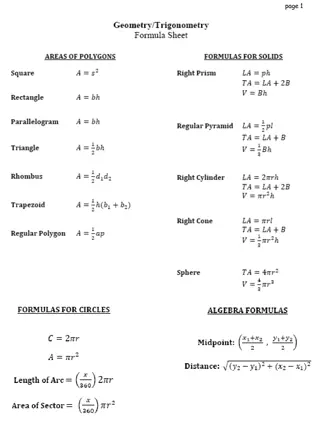LATERAL FLOW LIPOARABINOMANNAN TESTING AND QUALITY ASSURANCE TRAINING MATERIALS
This training program provides comprehensive materials for conducting quality-assured Lateral Flow Lipoarabinomannan (LF-LAM) testing in the context of Tuberculosis (TB) and TB/HIV co-infection. The agenda covers essential aspects such as test procedures, quality improvement, and participant objecti
4 views • 51 slides
Draft UN Regulation on DCAS Outline and Industry-Requested ADAS Use Cases
The Task Force on Advanced Driver Assistance Systems (ADAS) is developing a new UN Regulation focusing on ADAS systems up to level 2. The proposed regulation aims to address ADAS in general, emphasizing longitudinal and lateral support, safety nets for ADAS, driver engagement, and compliance assessm
6 views • 63 slides
General Characters and Comparison of Cyclostomata: Petromyzon vs. Myxine
Cyclostomata, a group of jawless vertebrates, comprises hagfishes and lampreys, exhibiting unique characteristics such as cylindrical body, lack of pair fins, smooth skin, and presence of mucous glands. They possess specific features like circular mouth with teeth, lateral line sense organ, and two-
0 views • 8 slides
Geometric Solids and Their Properties
Explore the concepts of cones and pyramids, including their volumes and surface areas. Learn how to calculate the volume of a cone or pyramid, find the surface area of their bases and lateral sides, and solve practice questions to enhance your understanding of these geometric figures.
1 views • 12 slides
Understanding Surface Area and Volume in Geometry
Gain insights into calculating surface area and volume of geometric shapes, specifically focusing on rectangular prisms. Learn how to find surface area and lateral area using formulas, and explore examples illustrating these calculations step by step with images.
1 views • 57 slides
Demonstration of Soft Parts of Lower Limb - Part 3 by Dr. Amber Rana at King George's Medical University
This presentation outlines the structures of the lateral compartment of the leg, posterior compartment of the leg, and dorsum of the foot. It includes information on boundaries, muscles, nerves, and vessels in each region, along with detailed descriptions of specific structures such as the peroneus
0 views • 15 slides
Understanding the Lateral Line System in Fishes for Aquaculture & Fisheries
The lateral line system in fishes is a crucial sensory organ that helps in adjusting to water conditions. It comprises the lateral line canal and neuromast organs, providing sensitivity to water currents and pressure. Specializations in different fish groups like sharks and teleosts showcase variati
7 views • 7 slides
Unlocking Creativity and Innovation: Lateral Thinking vs Logical Thinking
Embrace the power of lateral thinking to challenge assumptions, generate new possibilities, and break free from traditional logic. Discover how logical thinking and lateral thinking differ in their approach to problem-solving, and learn how to leverage both methods to spur creativity and innovation.
1 views • 35 slides
Demonstration of Lower Limb Soft Tissues - Part 3
This detailed demonstration by Dr. Amber Rana from King George's Medical University focuses on identifying and describing the structures of the lateral compartment of the leg, posterior compartment of the leg, and dorsum of the foot. It covers boundaries, muscles, nerves, and vessels present in each
0 views • 15 slides
Understanding Blood Pressure Physiology in a Lab Setting
Blood pressure (BP) is the lateral pressure exerted by the column of blood on the artery wall. This lab aims to determine BP at rest and after exercise using a sphygmomanometer and stethoscope. Learn about systolic and diastolic pressures, pulse pressure, and mean arterial pressure. Methods include
1 views • 17 slides
Understanding the Structure and Function of the Cerebrum
Dive into the intricate details of the cerebrum, the largest part of the forebrain. Explore its parts including the cortex, medulla, basal ganglia, and lateral ventricle. Learn about the lobes, important sulci, and gyri. Understand the types of fibers in the cerebral medulla and their functions. Unr
1 views • 20 slides
Anatomy of the Prevertebral Region in the Neck
The prevertebral region in the neck extends from the 1st cervical vertebra to the upper two thoracic vertebrae. It includes structures like prevertebral and paravertebral muscles, cervical plexus, sympathetic chains, and large vessels. The prevertebral muscles, including rectus capitis anterior and
0 views • 15 slides
Understanding Tennis Elbow: Causes, Symptoms, and Diagnosis
Tennis elbow, or lateral epicondylitis, is a painful condition caused by overuse, with symptoms including pain on the outside of the elbow that may radiate down the forearm. Activities like tennis, golfing, and repetitive wrist movements can trigger this condition. Common symptoms include elbow pain
0 views • 10 slides
Lateral Ankle Sprains: Return to Basketball Insights
This presentation discusses the impact of lateral ankle sprains on basketball players, focusing on the need for Return to Sport (RTS) guidelines, the PAASS framework, assessment tests, prevalence, and challenges in managing these injuries in basketball. Emphasis is placed on understanding mechanisms
1 views • 16 slides
Lateral Ankle Sprains Return to Basketball Presentation
This presentation focuses on the return-to-sport guidelines for basketball players after a lateral ankle sprain. It covers the prevalence of ankle sprains in basketball, the PAASS framework for assessment, specific tests for return-to-sport decisions, common impairments, athlete perception, sensorim
6 views • 16 slides
Comparative Studies on Metacarpals of Ox
This study examines the metacarpal bones of ox, focusing on the large metacarpal and the lateral small metacarpal. The large metacarpal consists of a shaft with distinct surfaces and borders, while the proximal and distal extremities have specific features for articulation and ligament attachment. T
4 views • 13 slides
Evolving Global Organizations for Agility and Scale
Explore the evolution of global organizations in the face of globalization, digital disruption, and shifting business models. Learn about designing structures for agility and scale, integrating global and local models, and navigating the complexities of the modern business landscape. The future lies
0 views • 27 slides
Understanding Meniscus Injuries: Anatomy, Evaluation, and Management
Explore the intricate details of meniscus anatomy, including the structures, attachments, and functions of the medial and lateral menisci. Learn about the mechanisms of injury, diagnostic approaches, operative and non-operative management strategies, and the importance of rehabilitation in restoring
1 views • 74 slides
Understanding Maglev Technology: Levitation, Propulsion, and More
Maglev technology, short for magnetic levitation, utilizes magnetic power to levitate and propel vehicles such as trains. This seminar explores the basic principles, types, and components of Maglev trains, focusing on Electromagnetic Suspension (EMS) and its levitation, propulsion, and lateral guida
0 views • 14 slides
Understanding Anatomical Directions and Movements in Sports Medicine
Anatomical directions play a crucial role in explaining the precise location of body structures in relation to each other. They are utilized regardless of the actual position of the body, with terms like superior, inferior, anterior, posterior, medial, lateral, proximal, and distal aiding in clear c
0 views • 38 slides
Improving Error Messaging in IFPS for Flight Plan Rejections
Proposal to enhance error messages in the Integrated Initial Flight Plan Processing System (IFPS) to differentiate between lateral rerouting and vertical constraint infringements, aiming to increase efficiency and reduce unnecessary costs for airlines. The current status indicates a system change re
0 views • 7 slides
Understanding Phonetics: Sounds, Symbols, and Classification
Explore the world of phonetics with a focus on speech sounds, the International Phonetic Alphabet (IPA), organs of speech, and different types of phonetics including acoustic, auditory, and articulatory phonetics. Discover the unique characteristics of English sounds, vowels (monophthongs and diphth
0 views • 13 slides
Management of Quittor in Equine Medicine
Quittor is a condition in horses characterized by necrosis of lateral cartilage, leading to sinus openings in the coronet region. It can result from infections, pastern region necrosis, or suppuration from neighboring lesions. Symptoms include swollen coronet with sinus openings, potentially leading
0 views • 26 slides
Characteristics of the Genera Psilotum and Tmesipteris
The class represented by Psilotum and Tmesipteris features rootless sporophytes with subterranean rhizomes and aerial shoots, dichotomous branching, rhizoids for nutrient absorption, scale-like or leaf-like appendages, protostelic or siphonostelic stele, eusporangiate sporangial development, homospo
0 views • 9 slides
Development of Prostatic Exosomal Protein Lateral Flow Chromatographic Strips for Chronic Prostatitis Detection
Chronic prostatitis/chronic pelvic pain syndrome (CP/CPPS) is a common urological condition with potential links to prostate cancer. Current diagnosis methods lack reliability, prompting the development of a novel point-of-care platform using prostatic exosomal protein as an indicator. This study fo
0 views • 20 slides
Da Vinci Popsicle Stick Bridge Challenge
Explore the world of engineering and creativity with the Da Vinci Popsicle Stick Bridge Challenge. Build a self-supporting bridge inspired by Leonardo Da Vinci's designs using only popsicle sticks. Learn about tension, lateral forces, and teamwork. Dive into STEAM topics while having fun constructin
0 views • 8 slides
Lateral Flow Readers Market
The Global Lateral Flow Readers Market size is expected to be worth around USD 3.3 Billion by 2033 from USD 1.7 Billion in 2023, growing at a CAGR of 6.9% during the forecast period from 2024 to 2033.\n\n
0 views • 2 slides
Stakeholder Alignment and Commons Valuation in Complex Systems
Explore the challenges and strategies involved in stakeholder alignment and valuing the commons in complex systems through insights from various sources. Key themes include lateral stakeholder alignment, shared visions, leadership approaches, and building trust for effective partnerships.
1 views • 11 slides
Radiology Techniques for Upper Limb Imaging at Al-Mustaqbal University College
Explore radiographic imaging techniques for upper limbs including fingers and thumbs at the Radiology Techniques Department of Al-Mustaqbal University College. Learn about PA, lateral, oblique, and AP views for detailed analysis. Proper positioning and imaging guidelines are provided to ensure accur
0 views • 20 slides
Enhancing Defensive Skills and Situational Awareness in Hockey
Enhancing defensive skills and situational play in hockey is crucial for success. All team members can contribute to team defense by developing skills like skating, body checking, understanding the ice surface defensively, read and react abilities, and effective communication. Proper skating skills
3 views • 45 slides
Addressing Incivility in Nursing: A Call for Respect and Compassion
Explore the prevalence of incivility in nursing through insightful statistics and images, shedding light on the challenges faced by new grads and experienced nurses alike. Learn about the harmful effects of behaviors like lateral violence and bullying, and the importance of promoting civility in hea
0 views • 49 slides
Rapid Diagnostics Market on Track to Reach $26.4 Billion by 2029
Meticulous Research\u00ae\u2014a leading global market research company published a research report titled \u201cRapid Diagnostics Market by Product (Kits [OTC, Professional], Readers), Platform (Lateral Flow, Serological, PCR), Application (Blood Gl
0 views • 3 slides
Logistics and Communications Readiness Review Briefing
This briefing covers various aspects of logistics and communications readiness, including roll call, agenda, logistics readiness overview, FLIPLS details, projects overview, work orders, property book readiness overview, incoming and outgoing lateral transfers, excess equipment status, monthly inven
0 views • 30 slides
Lateral Ear Canal Resection (Zepp's Operation) by Dr. Gulshan Kumar
Lateral ear canal resection, also known as Zepp's operation, is a surgical procedure performed by Dr. Gulshan Kumar, MVSc, PhD. This operation involves the removal of a portion of the lateral ear canal to treat various ear conditions. The images show different stages of the procedure, providing a vi
0 views • 6 slides
Understanding Plant Meristems and Growth Patterns
Explore the fascinating world of plant meristems, the small clumps of cells responsible for elongation of roots and shoots, as well as the different types of primary meristems and their roles in plant growth. Learn about apical and lateral meristems, primary tissues, and the organization of the plan
0 views • 33 slides
Understanding Amyotrophic Lateral Sclerosis (ALS) and Case Study Analysis
Amyotrophic Lateral Sclerosis (ALS) is a progressive neurodegenerative disease affecting motor neurons, leading to muscle weakness and various symptoms. This case study focuses on Judy, a 52-year-old woman diagnosed with ALS, detailing her symptoms, progression, exercise routine, assistive device us
0 views • 16 slides
Understanding Lateral Neck Masses: Anatomy, Diagnosis, and Management
Explore the anatomy and lymphatic drainage of the neck to effectively approach and differentiate various lateral neck masses. Learn about the anterior and posterior triangles of the neck, common neck mass differentials, and the significance of lymph nodes in neck pathology.
0 views • 65 slides
Development of Head and Neck Mesenchyme in Embryonic Formation
The formation of the head and neck region in embryonic development involves mesenchyme derived from paraxial mesoderm, lateral plate mesoderm, neural crest, and ectodermal placodes. Paraxial mesoderm contributes to brain case and muscle formation, while lateral plate mesoderm forms laryngeal cartila
0 views • 34 slides
Geometry Concepts for Surface Area Calculations
Explore various geometric shapes such as pyramids and cones to calculate surface area. Learn the differences between prisms and pyramids, understand the importance of altitude and slant height in pyramids, and differentiate between lateral and surface areas. Practice finding lateral and surface area
0 views • 16 slides
Understanding Geometry: Lateral Area, Total Area, and Volume of Right Prisms
This educational content covers the concepts of lateral area, total area, and volume calculation for right prisms, specifically focusing on rectangular, triangular, trapezoidal, and hexagonal right prisms. It includes detailed explanations, formulas, and examples to help you grasp these geometric pr
0 views • 22 slides





